It is a truth, universally acknowledged, that the 1970s was the greatest era in cinema history. My blatant plagiarizing of Jane Austen aside, I think we can all agree that the 70s gifted us with some of the finest movies ever made. American cinema shone with auteur driven projected unaffected by studio influence, until the ‘Heaven’s Gate’ debacle in 1980 changed everything. Francis Ford Coppola was at his very best, giving some of the greatest cinematic achievements in ‘Apocalypse Now’, ‘The Conversation’ and The Godfather Part I & Part II. Martin Scorsese produced his crowning masterpiece, ‘Taxi Driver’ and Roman Polanski revolutionized film-noir with ‘Chinatown’. But, while heaping praises on Hollywood, we often tend to forget the 70s was also one of the greatest decade for world cinema. So, The Cinemaholic has decided to come up with a list of the Greatest Non-Hollywood Movies of the 70s.
Making a list like this was not an easy task – we started out with 10, which then had to be stretched to 12. As someone who loves Indian cinema, I desperately wanted this list to have Indian movies, but while several of Satyajit Ray, Ritwik Ghatak and Adoor Gopalakrishnan classics were considered, none of them could make it in. A longer list would most certainly have included them. That said, we feel we have come up with a list that is fairly definitive and comprehensive. We expect dissensions and disagreements from our readers, and we hope it will contribute to the larger discourse on cinema. Here is the list of top foreign movies of the 70s.
12. Amarcord (1973)
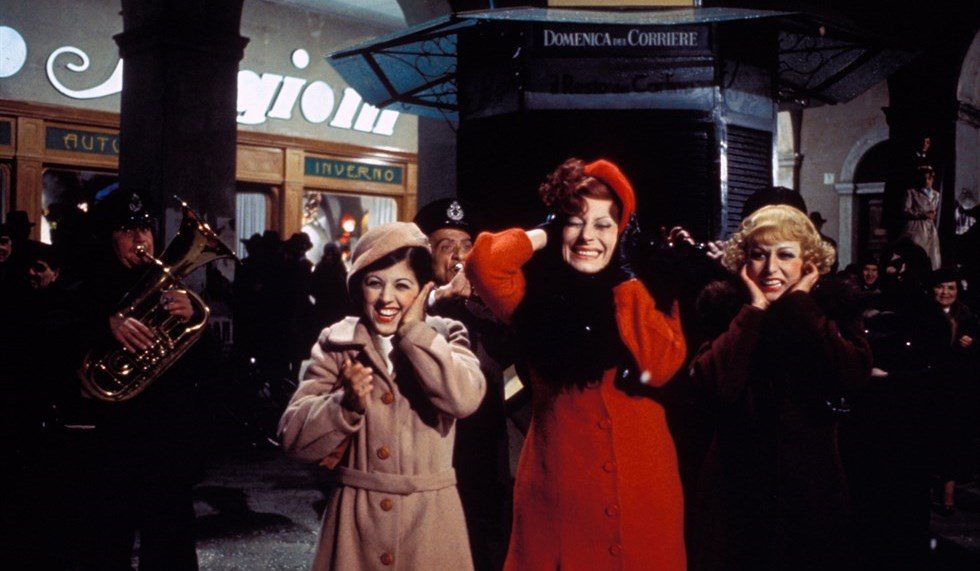
Federico Fellini is universally hailed as one of the greatest auteurs in cinema history, and while ‘Amarcord’ might not be his greatest work, it still is a crowning achievement from the Italian master. Portraying a year in the life of a small Italian coastal town in the 1930s during the Fascist regime of Mussolini, ‘Amarcord’ is largely based on Fellini’s experiences growing up under a similar social milieu. Over-the-top, extravagant, funny and unabashedly sentimental, ‘Amarcord’ might well be Fellini’s most personal work, where we see a bunch of quirky characters living a largely inconsequential life while being largely oblivious to the social and political reality around them. The movie won Fellini an Academy Award for Best Foreign Language Film, and is remembered today for its stinging indictment of the Italian people of those times for their refusal to outgrow childish fantasies and accept moral, ethical and social responsibility.
11. Salo, or the 120 Days of Sodom (1975)
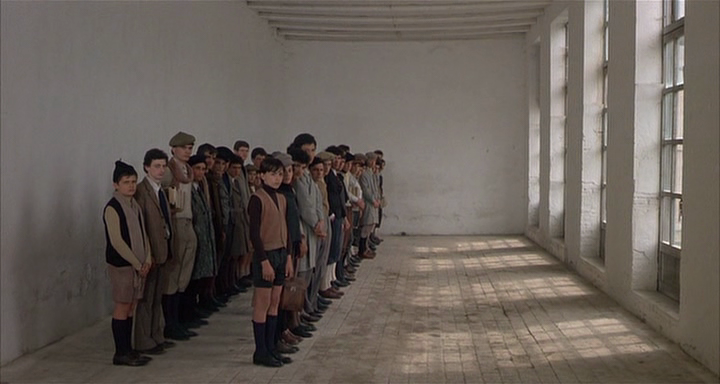
This is probably obviously a very controversial choice – for ‘Salo’ is a movie that evokes a sense of anger, disgust and outrage in a lot of people. Frequently listed as one of the most controversial movies in the history of cinema, ‘Salo’ is today hailed as a genuine cinematic masterpiece by many with the same fervor that others hate it. I, ostensibly belong to the former, as rarely in my life have I seen a movie that is so exquisitely clear in its vision. It is easy to mistake ‘Salo’ as any other violent, explicit and brutal exploitation film, but scratch beneath the surface and you will discover a certain detached emotional awareness and layered political commentary that is rare for such films. Set in Italy during the early 40s under the fascist Republic of Salo, the movie follows four wealthy and powerful libertines who kidnap a group of young men and women and subject them to months of brutal physical, emotional, sexual and psychological torture, as part of a perverse ritual. Seamlessly transporting Marques de Sade’s controversial pornographic novel (120 Days of Sodom) into a fascist setting, auteur Pier Paolo Pasolini crafts a compelling and often unwatchable portrait of existence under fascism and absolute power. I’m speculating here, but one of the reasons why a lot of people (even ardent cinephiles) don’t take to ‘Salo’ might be because it needs to viewed twice, but a second viewing is almost impossible. But, to me, ‘Salo’ is one of the most powerful pieces of cinema ever; a harrowing portrayal of the “pornography of power”.
10. Cries and Whispers (1972)
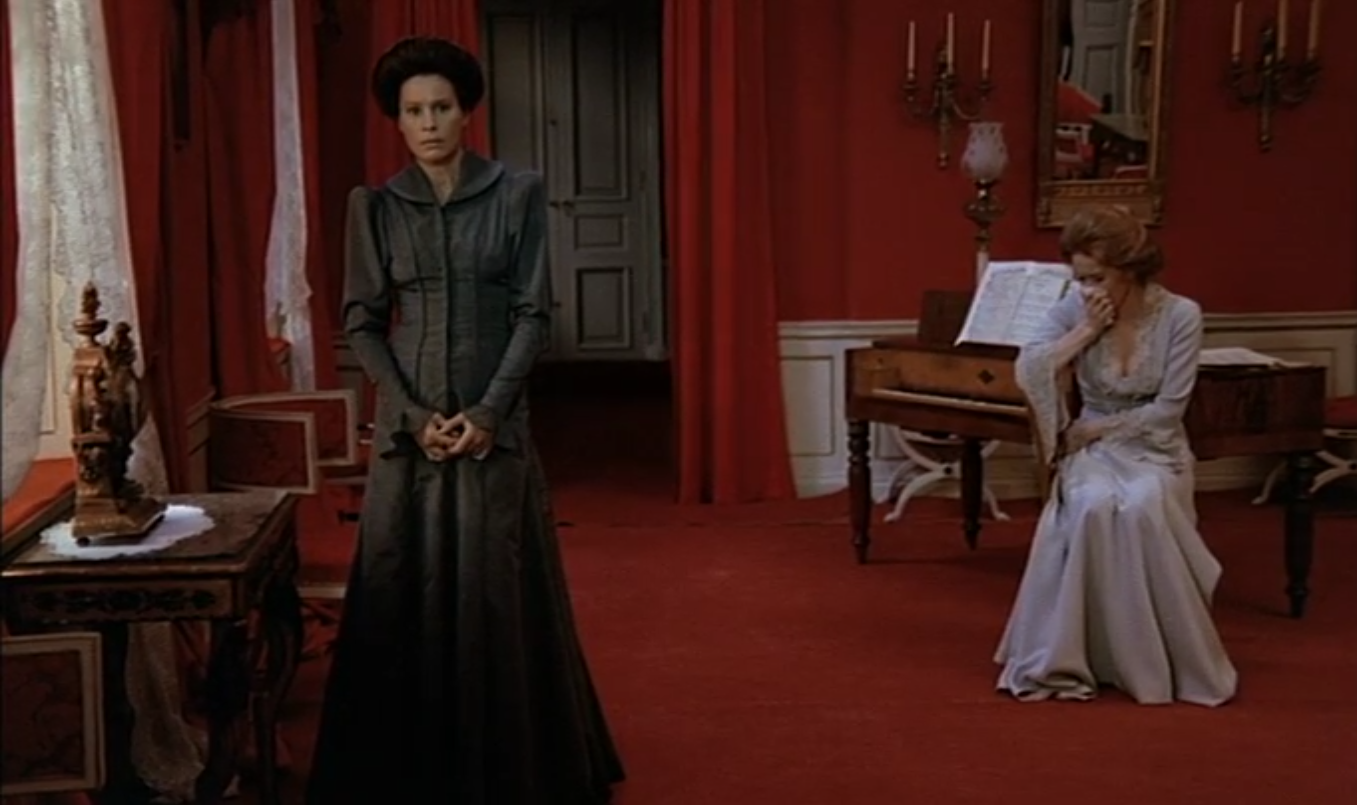
Swedish auteur Ingmar Bergmann is unarguably amongst the greatest directors in the history of cinema, a genius who gifted us with masterpieces like ‘Persona’, ‘The Seventh Seal’ and ‘Wild Strawberries’. Amongst these towering cinematic achievements, it is quite easy forget the brilliance of ‘Cries and Whispers’. A period drama following the life of two sisters looking after their third sister in her deathbed, Bergman manages to surprise you with his fierce evocation of human feeling and the sub textual emotional undercurrent of love and resentment. Exquisitely shot with generous usage of saturated colors, ‘Cries and Whispers’ takes up the familiar Bergman-esque themes of faith, redemption and the female psyche and further explores them with uncharacteristic sensitivity and feeling. The movie is quite sad, melancholic and hypnotic, and the characters slowing burn themselves in your psyche while evoking your own fears, regrets and bottled-up desires. An underrated gem, ‘Cries and Whispers’ is one of the finest films by Bergman and deserves far more attention that it gets.
9. The Holy Mountain (1973)

Alejandro Jodorowsky is arguably the most profoundly absurd and mystical filmmaker cinema has ever seen; never in the history of cinema have we seen anybody like him and we probably never will. Masterfully intertwining dreamy surrealism with a mishmash of eastern and western philosophies and mythologies, Jodorowsky always manages to create something wildly original. And the ‘The Holy Mountain’ is his magnum-opus, a spiritual successor to the spectacular debut ‘El Topo’ that not only surpasses the absurd imaginativeness of the latter, but is also one of the most exhilarating and psychedelic cinematic experiences you’ll ever have. A fantasy-adventure about a group of men and women on a quest for immortality, ‘The Holy Mountain’ is laced with grotesque imagery and absurdist sequences that may be challenging for some, but to those willing to invest in Jodorwosky’s farcical world, it is a spiritual experience unlike any other. An allegory on the idea of existence under political, religious and psychological captivity, ‘The Holy Mountain’ is an incredibly powerful and provocative piece of cinema.
8. Le Cercle Rouge (1970)
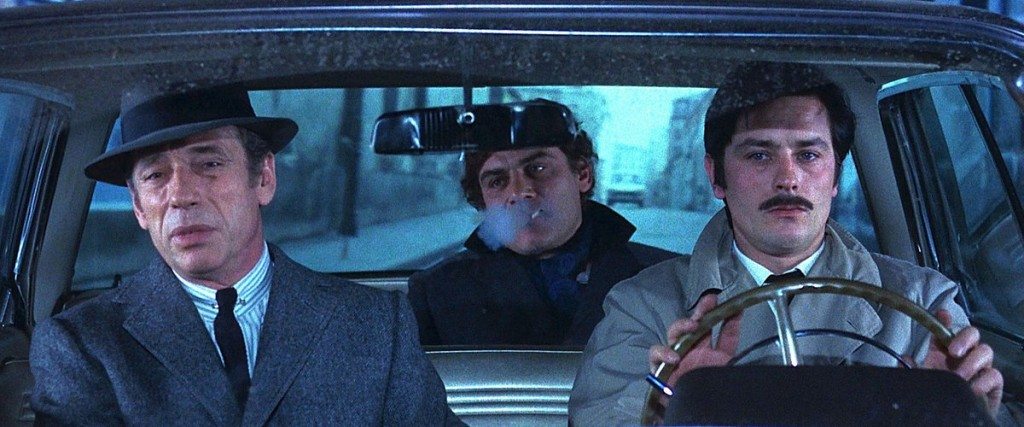
Jean-Pierre Melville is not a name you will find mentioned amongst the pantheons of French cinema, which are always dominated by the auteurs of The French New Wave like Jean Luc-Godard and François Truffaut; but the fact remains that Melville is one of the most audacious and imaginative filmmakers French cinema has ever produced. With a somber setting, realistic action and rich characterizations, Melville practically revolutionized the face of crime cinema and film-noir. And ‘Le Cercle Rouge’ is one of his finest works, a thematically luscious heist-thriller that slowly unfolds over two hours while meticulously exploring psyche of the criminal mind. Following the life of a seasoned criminal after his early release from prison as he plans and executes his next heist,‘Le Cercle Rouge’ portrays its characters with depth, nuance and humility, unlike the plethora of loud and incoherent crime thrillers we are usually thrust upon. Ultimately, ‘Le Cercle Rouge’ stands out as a piece of flawless film-making (the protracted final heist sequence is exquisitely crafted and is amongst my all-time favorite sequences); each viewing more satisfying than the previous one. In short, ‘Le Cercle Rouge’ is the best heist film I’ve ever seen and makes ‘Oceans’s 11’ look bland and uninspiring.
7. Aguirre, The Wrath of God (1972)
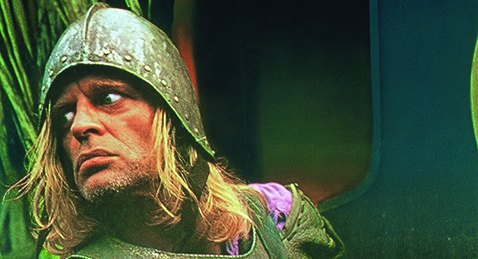
An epic adventure-drama that follows the explorations of Spanish soldier Lope de Aguirre, who leads a group of conquistadores down the Orinoco and Amazon River in South America in search of the legendary city of gold, El Dorado, ‘Aguirre’ is today regarded as one of the most influential movies of the 20th century. German auteur Werner Herzog, in only his third feature, journeyed into the depths of the Amazon jungle, and crafted a searing, gut-wrenching masterpiece about man’s insurmountable clash with nature and its inevitable consequences. Featuring the volatile Klaus Kinski in the titular role of a madman struggling to keep his dream alive amidst the inevitable doom awaiting him, ‘Aguirre’ paints a disturbing portrait of humanity where greed, ambition and power trumps love and compassion. Herzog employs a very austere and minimalist style, seamlessly juxtaposing the calm, serene yet treacherous nature with the obsessive madmen in pursuit of a non-existent destination, slowly trudging towards their impending fate. A viscerally haunting cinematic experience, ‘Aguirre’ is a seminal piece of cinema that continues to influence movies across the globe.
6. Stalker (1979)

Andrei Tarkovsky is, to me, the greatest filmmaker of the 70s; a man who made three seminal pieces of art that revolutionized the cinematic language. It is hard for me to express my love and admiration for the man, for his cinema has made an indelible mark on my life; emotionally resonating with me in ways I believed were impossible. ‘Stalker’, the last of the troika of philosophical gems he made during the decade, is probably his most daunting work; a science fiction drama that will probably change the way you perceive your life. ‘Stalker’ follows an expedition led by a man known as the Stalker, who leads a melancholic writer and professor to a site known simply as the Zone, which is purported to have power to fulfill your innermost desires. Set in a dystopian future, ‘Stalker’ has the Stalker and his companions journeying through a crumbling social set-up as they engage in a host of existential and philosophical arguments. ‘Stalker’ is painstakingly slow, with Tarkovsky famously commenting that it was deliberate as he wanted the audience who walked into the wrong theater have time to leave “before the main action starts”. But, once you surrender yourself to Tarkovsky, he holds you with both hands and gently nudges us forward as we, like the protagonists, undertake a journey deep into our own consciousness. And by the end, we will be nowhere close to the answers we were looking for, but the journey itself will is worth all the effort.
5. The Ascent (1977)
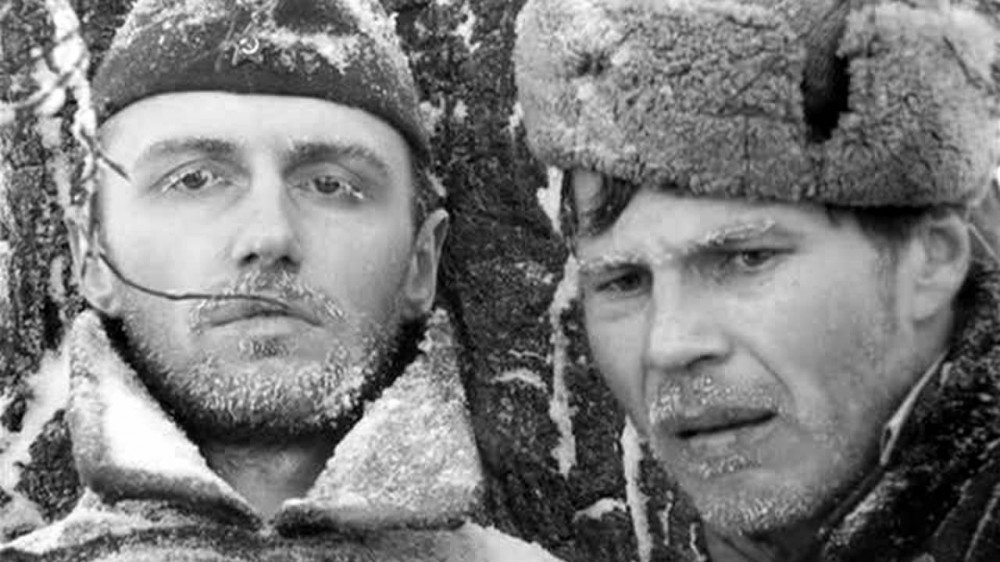
Larissa Shepitko’s emotionally devastating and harrowing Russian drama, set in the German-occupied Soviet territory during the World War II, is probably the greatest war film I’ve seen after Coppola’s ‘Apocalypse Now’. Following two Soviet Partisans (Soviet guerrilla soldiers) as they evade German patrols while searching for food for their group, ‘The Ascent’ is technically brilliant and emotionally daunting; a war movie which raises questions in you that may be too uncomfortable to even think about, let alone answer. Brilliantly shot and featuring excellent performances by the entire cast, ‘The Ascent’ deftly follows these two men as they wade through dangerous waters as their principles and convictions are tested in the most terrifying way imaginable. Sheptiko is not interested in these men’s past, rather focusing on the present and how they react to the savagery that has enveloped them; perhaps even engulfed them. A devastating portrait of patriotism and morality under siege, ‘The Ascent’ is one of the few films that left me in a state of unease and hopelessness long after it was over.
4. Solaris (1972)
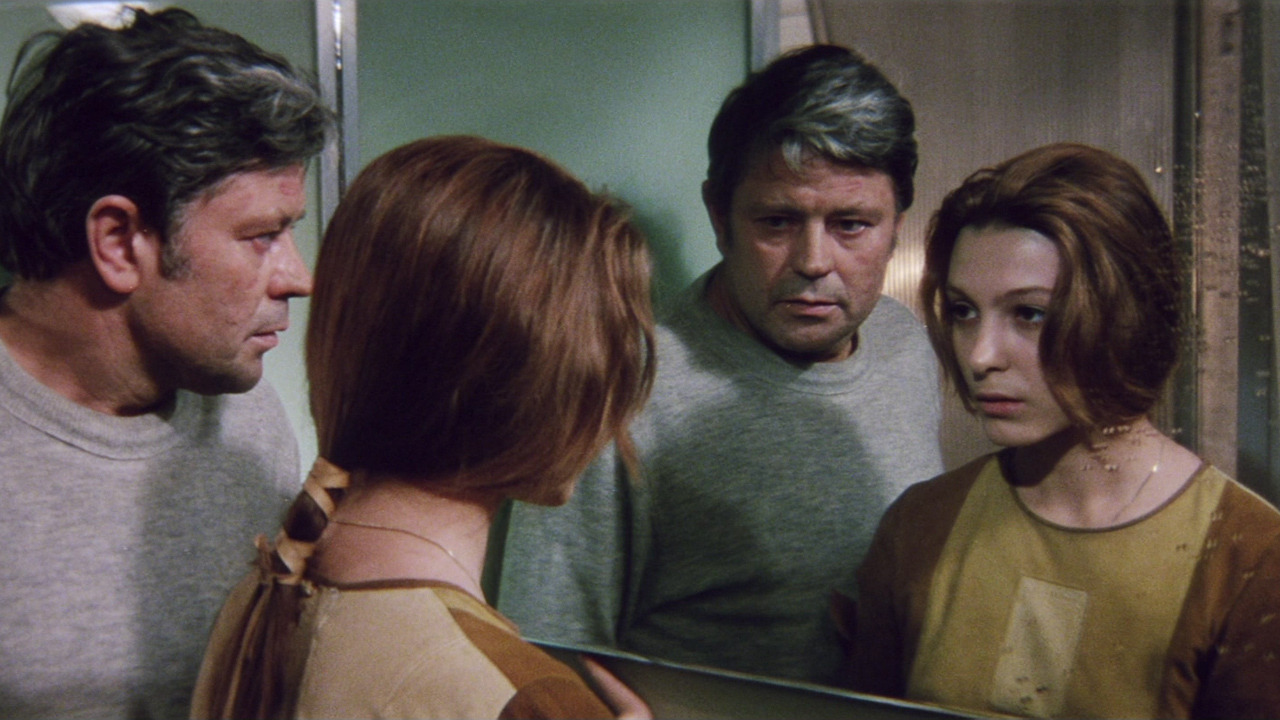
Yes – my love for Andrei Tarkovsky continues with this space science fiction drama, which in my opinion is Tarkovsky’s most accessible film. Considered during the time as Tarkovsky’s answer to Kubrick’s sci-fi magnum opus, ‘2001: A Space Odyssey’, ‘Solaris’ though is unmistakably Tarkovskian, and couldn’t be more different from the Kubrick masterpiece – while ‘2001: A Space Odyssey’ is a grand spectacle about the infinite possibilities of the universe, ‘Solaris’ is a more self-introspective look into the subtle intricacies of the human experience. Often proclaimed as one of Tarkovsky’s more challenging works, ‘Solaris’, sure is very slow in building up its narrative and is inexplicably obscure, but its inherent humility and fierce humanity is quite universal in its rendering. As we see our protagonist journey into the distant planet of Solaris to investigate the unexplainable behaviour of the crew stationed there, the juxtaposition of a man conquering the mysteries of the universe while still being oblivious to the pain and sorrow within himself becomes all too apparent. The motifs of love, longing, grief, guilt and redemption are resonant all throughout the film, as we see a man struggling deal with his loss and slowly slipping away into obscurity. ‘Solaris’, despite its “artsy intellectual” status, is an experience that will touch your heart and soul and very few movies have the power to do that.
3. That Obscure Object of Desire (1977)

‘That Obscure Object of Desire’ is a movie that I haven’t been able to get out of my mind ever since I first saw it two years back. And in these two years, I have revisited this gem so many times, and each time the fascination just grows. Helmed by the criminally underrated genius Luis Buñuel, who first burst into cinema with his path-breaking avant-garde short film ‘Un Chien Andalou’ in collaboration with the legendary surrealist painter Savador Dali. Almost half a century later, the man made his last (and arguably his finest) film with ‘That Obscure Object of Desire’, an outrageously funny and perverse romance between an aging Frenchman and a young seductress played interchangeably by two actresses. Yes, you heard that right – Buñuel is at his subversive best is he casts two different women two play the one character, and we are left with our mouths gaping as he plays around with our expectations and frustrations with impunity. Buñuel has spent his entire career exploring the unsaid desires and dark fetishes of the human mind, but with ‘That Obscure Object of Desire’, he raises the stakes as he sets his narrative in a politically volatile France while the characters themselves are oblivious to the reality surrounding them until it ends up consuming them. A subtle portrait of the nature of terror and violence that has consumed modern societies (which is as relevant today as it was then), ‘That Obscure Object of Desire’ is as depraved and decidedly “obscure” as you expect a Buñuel film to be.
2. The Mirror (1975)

Let’s just get it out of the way once and for all – Andrei Tarkovsky’s ‘The Mirror’ is a movie that has changed my life. Now, not a lot of movies have done that for me; and it is hard not to think of one of them while your experiencing this one. People often compare the grandeur and vision of Terrence Malick’s ‘The Tree of Life’ to ‘2001: A Space Odyssey’, when in fact it has more in common with Tarkovsky’s magnum-opus. A loosely autobiographical tale of a man reminiscing his childhood growing up in 1930s Russia, ‘The Mirror’ is a movie that literally (and figuratively) wove poetry on film and changed the language of cinema forever. A challenging yet ultimately rewarding experience, ‘The Mirror’ effortlessly subverts all narrative structure in favor of a more visceral and transcendental experience and we flow into the memories of a man whose existence is slowly slipping away. It is also one of the most beautiful movies ever made; each frame is exquisitely crafted and is tinged with an aura of melancholy that hits you emotionally. Using the fragmented memories of a dying man, ‘The Mirror’ recaptures the life and times of a period in history with honesty and empathy. Arguably the most intimate work from Tarkovsky’s distinguished oeuvre, ‘The Mirror’ is ultimately about every one of us – our frailties, our regrets and our place in the world.
1. Jeanne Dielman, 23 quai du Commerce, 1080 Bruxelles (1975)
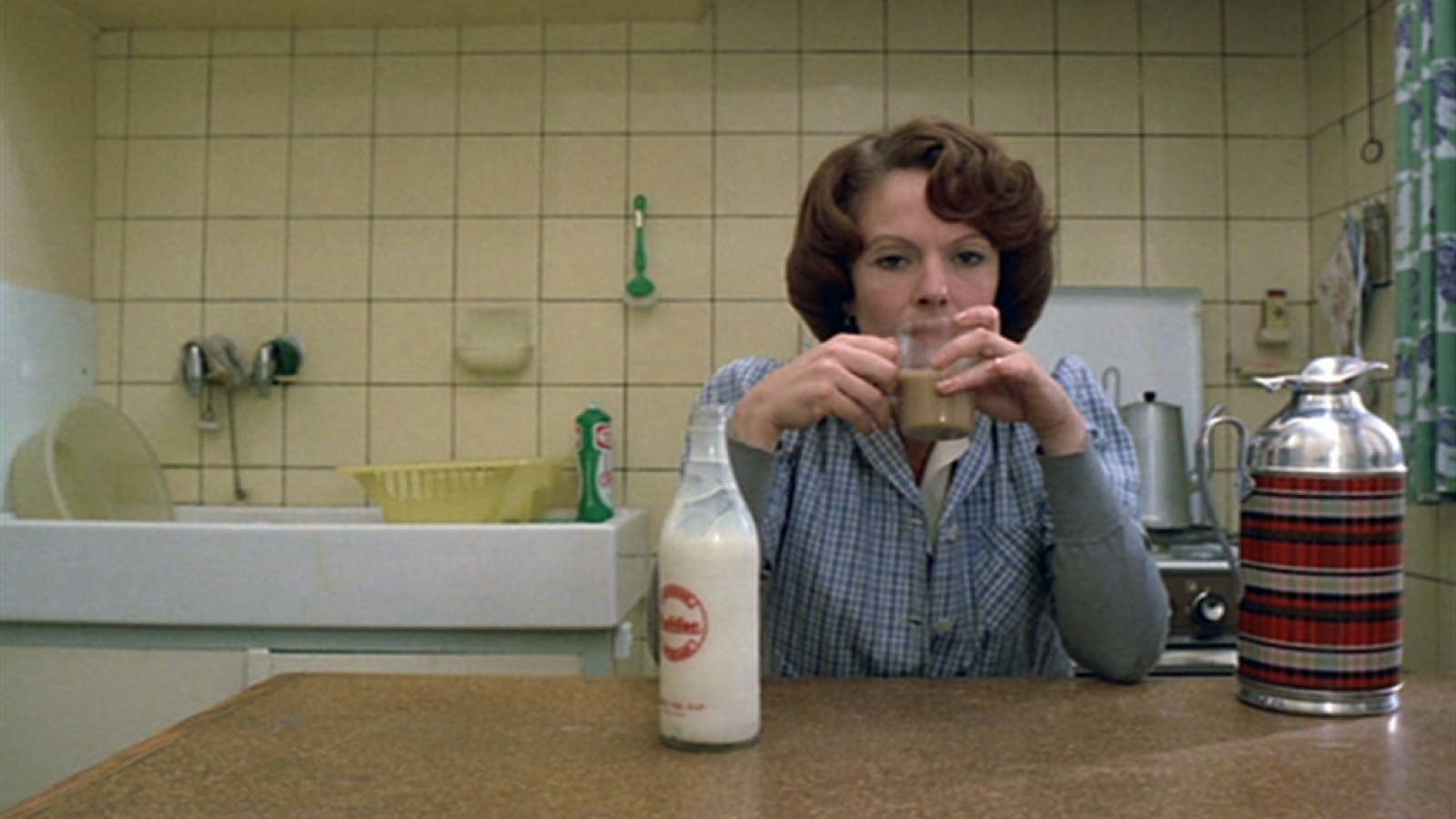
Young Chantel Akerman, all of 15, watched the great French auteur Jean Luc-Godard’s ‘Pierrot Le Fou’ one night at the movies. Such was the movie’s influence on her that she decided the same night that she wanted to make movies. This was in 1965. A decade later, armed with nothing but a minuscule government grant and an all-woman crew, this 25-year-old took a huge plunge into a man’s world, thereby conceiving one of the most compelling pieces of cinema ever made – a movie that has changed my perspective of the world and imprinted itself into my cinematic journey. ‘Jeanne Dielman, 23 quai du Commerce, 1080 Bruxelles’ is the kind of movie that will make you re-evaluate your own life and existence. In fact, such is the universality of Akerman’s narrative that it is eerily relatable to your own lives. With over 200 minutes of run-time and blatantly disregarding all rules of conventional cinema, ‘Jeanne Dielman’ portrays the boring, mundane life of a widowed mother of a teenage son over three days, when a minute aberration in her perfectly constructed routine results in her unraveling over the last day. An immaculate portrayal of the nondescript and inconsequential lives that we all lead, the atmosphere of existential dread that runs throughout the movie is palpable. Much like the characters of the Antonioni classic ‘L’Avventura’, Jeanne is a woman who is bound by the curse of existence, nonchalantly trudging along each day of her life without any verve or excitement. This bleak view of humanity is something that I personally relate to and when it translates on-screen with such uncharacteristic realism, it is hard not to be swept away by it. Arguably one of the most experimental and experiential works ever conceived, ‘Jeanne Dielman’ is an unabashedly feminist film and will always be remembered for having the most complex, layered and nuanced portrayal of a woman in the history of cinema.
Read More: Best Movies of the 1970s

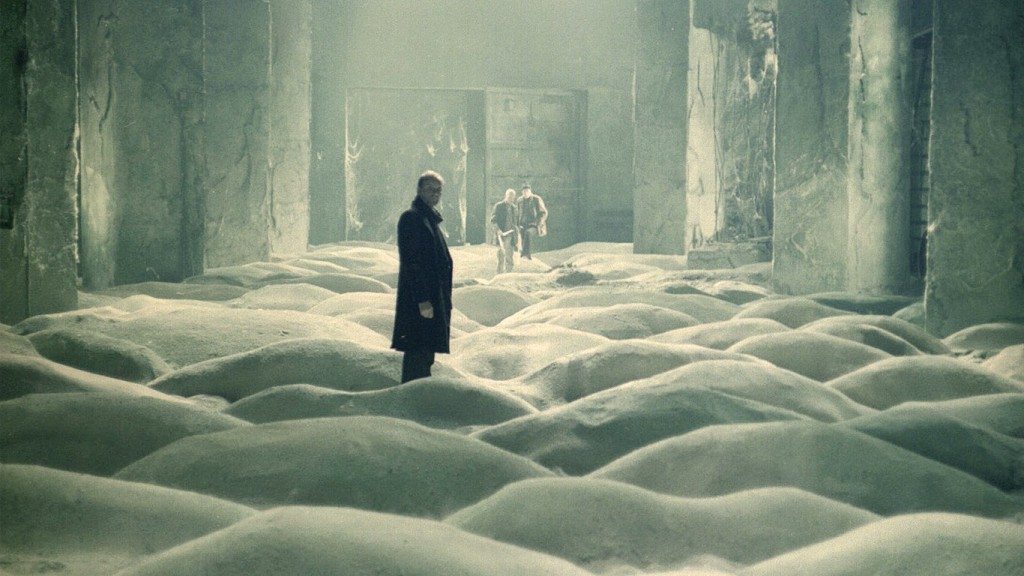
You must be logged in to post a comment.